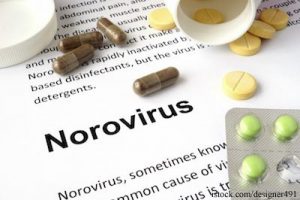Almost 100 students are sick at the University of Michigan at Ann Arbor with what has been confirmed as a norovirus outbreak. The first illnesses were reported a week ago, with people suffering with vomiting and diarrhea. At least 25 people have been to emergency rooms in the area. Those sickened all live in university housing.
 Dr. Robert Winfield, the University’s chief health officer said, “we believe that this number does not reflect the actual extent of the illness, as students are generally following our advice to self-isolate in their rooms.” The outbreak was first identified among students living at West Quad and South Quad.
Dr. Robert Winfield, the University’s chief health officer said, “we believe that this number does not reflect the actual extent of the illness, as students are generally following our advice to self-isolate in their rooms.” The outbreak was first identified among students living at West Quad and South Quad.
Students are asked to stay in their rooms if they are sick, and to practice good hygiene. Also avoid sharing food and drinks, and do not handle, prepare, or serve food for others if you are sick, especially with a diarrheal illness.
Clean and disinfect contaminated surfaces such as cell phones, door handles, keyboards, and counter tops. Chlorine wipes are most effective against norovirus. And wash your hands after using the bathroom with soap and water for at least 20 seconds. Hand washing is more effective than hand sanitizer against norovirus, but if you can’t wash your hands, use sanitizer. Wash any soiled clothing or linens in hot water. And try to stay in your room for 48 hours after the last episode.
Norovirus is very contagious and spreads from person to person, through contaminated food and drink, and by touching contaminated surfaces and then touching your mouth or nose. Both vomitus and stool are contagious. Symptoms of this illness include nausea, vomiting, abdominal pain, diarrhea, and fever.
The university is going to use a special virus-related cleaning procedure in all dining facilities and residence halls. Students can contact UHS if they want to talk to a health care provider.
Most people with norovirus recover within a few days, but some people can become dehydrated and need to be hospitalized. People with chronic health problems and compromised immune systems are most at risk for complications from this illness.
To take care of yourself, do not eat or drink anything for several hours after you throw up, but make sure that you sip small amounts of water or suck on ice chips every 15 minutes for three to four hours so you don’t become dehydrated. Then sip clear liquids, such as broth, water, or sports drinks. When you can tolerate those items, you can eat small amounts of bland foods, such as applesauce, soda crackers, or bananas. Avoid spicy or fatty foods for a few days after you feel better.
If you can’t keep down liquids or food for more than 24 hours, seek medical attention because you may be becoming dehydrated. If you have a 101°F fever or higher with abdominal pain, see a doctor or call student health services. And if you have diarrhea for more than three days without seeing gradual improvement over five days, see a doctor. Signs of dehydration include decreased urination, severe fatigue, and light headedness.




